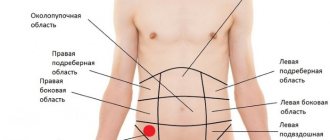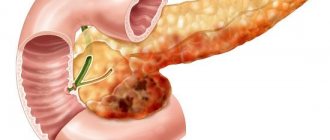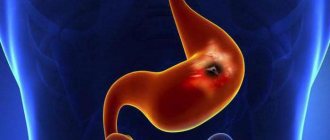GastrituNet.ru » Stomach diseases » Syndromes » Stomach pain
Pain in the stomach at any time of the day is a sign of acute or chronic disease of this organ, as well as other parts of the digestive tract. However, at night, unpleasant sensations cause maximum discomfort. We talk about why your stomach hurts at night and what to do in this case.
- 1 Why does my stomach hurt at night?
- 2 What does stomach pain at night mean?
- 3 Stomach hurts at night - how to diagnose
- 4 Treatment
- 5 Useful video
Why does my stomach hurt at night?
Night pain in the stomach is often also called hungry pain, as it occurs 4-6 hours after dinner (the last meal). During this time interval, the food bolus completely leaves the upper parts of the digestive tract, and they remain empty. As a rule, night pain syndrome is observed by patients from 3 to 5 am.
The main cause of pain at night is the effect of digestive juices on the mucous membrane of the organ. In addition to hydrochloric acid, gastric secretions contain the digestive enzyme pepsin. Acting in combination, these substances ensure the breakdown of food, but in addition they can also destroy the cells of the organ mucosa. If the digestive tract is damaged by poor nutrition, the effects of nicotine, alcohol, chronic stress, the action of active juice at night further irritates the mucous membrane, which causes pain.
In addition, night pain syndrome can be caused by spasm of the stomach muscles, which in turn occurs as a result of:
- eating poor quality food,
- errors in the diet (eating dry food, on the run, excessively spicy and fatty foods),
- acute and chronic stress,
- overeating during dinner
- excessive physical activity,
- diseases of other gastrointestinal organs (pancreatitis, cholecystitis, colitis).
Quite often, night pain in the epigastric region is accompanied by heartburn, a feeling of nausea, and sour belching.
Classification of abdominal pain after eating
Depending on the nature of the pain, the following types can be distinguished:
| Long-term acute | Food poisoning, acute gastritis, inflammatory process in the pancreas, disorders of the gastric mucosa |
| Short-term acute | Poor circulation, esophageal spasms |
| Pulling | Gastritis in chronic form, peptic ulcer in its infancy, overeating, fast eating |
| Burning | The course of the inflammatory process in the gastric mucosa or pancreas |
| Cramping | Disruption of the esophagus due to gastrointestinal infection |
What does stomach pain at night mean?
Regular discomfort in the stomach at night is one of the manifestations of chronic gastritis. The pain is aching and of medium intensity. Treated with antacids.
Night pain is a characteristic symptom of a duodenal ulcer. The discomfort is localized in the epigastric region - the epigastric region.
Stomach ulcers can also cause night pain. It is characterized by high intensity. Taking antacids in this case is ineffective.
Night pains are not always associated with diseases of the stomach; pathologies of other organs and systems manifest themselves in a similar way. Consider the main ones.
- Acute and chronic pancreatitis . The pain in this case radiates from the epigastric region to the back and seems to encircle the body. May be accompanied by uncontrollable vomiting. The intensity of the unpleasant sensations is quite high. Taking alcohol in combination with too fatty foods provokes a painful attack.
- An attack of cholecystitis . Pain sensations are localized in the epigastrium and spread to the right hypochondrium and the right side of the back. They are of high intensity and cramping in nature, accompanied by nausea and vomiting. They are relieved by taking antispasmodic drugs, such as no-spa, duspatalin.
- Acute appendicitis. In some cases, with an abnormal location of the appendix and its inflammation, a person feels pain in the epigastric region and upper abdomen. The peculiarity of pain in this case is that it gradually shifts to the right parts of the abdominal cavity and is accompanied by general malaise, nausea, and fever.
- Acute myocardial infarction . Necrosis of the heart muscle is accompanied by high-intensity pain and can be felt as pain in the stomach. For differential diagnosis, it is necessary to pay attention to the presence of shortness of breath, interruptions in heart rate, drop in blood pressure, pale skin, and cold sweat.
Pathologies that cause pain in the evenings
At this time of day, GERD makes itself felt.
- GERD is a recurrent multisymptomatic disease of inflammatory lesions of the distal esophagus. The development of this disease is accompanied by a decrease in the tone of the lower esophageal sphincter and a slowdown in the cleansing of the esophagus. Symptoms: belching with a sour and bitter taste, heartburn, nausea, vomiting.
- An ulcer is a disease in which ulcers form in the mucous membranes of the stomach as a result of pathological processes. Signs of the disease are pain in the upper abdomen, which worsens at night, sour belching, heartburn, heaviness in the abdomen, etc. In many cases, the ulcer occurs in men from 20 to 50 years old.
- Abdominal migraine is one of the variants of migraine. A paroxysmal idiopathic disorder characterized by episodes of central abdominal pain lasting from 1 to 72 hours. With this disease, patients usually have dull pain, and pale skin may occur.
Stomach hurts at night - how to diagnose
If night pain occurs regularly, you should contact a gastroenterologist for examination. The main method for diagnosing stomach diseases is esophagogastroduodenoscopy (EGD). The essence of the study is to examine the digestive tract from the inside using a flexible endoscope inserted through the mouth.
EGDS allows you to visualize the mucous membrane of organs on the monitor screen. Using this method, the diagnosis of acute and chronic gastritis, gastrointestinal erosions, and peptic ulcers is confirmed. A big plus of gastroscopy is the ability not only to examine, but also to simultaneously carry out surgical procedures: taking material for a biopsy, stopping bleeding, and administering medications.
Fibroscopy is performed on an empty stomach; no special preparation is required. With the subject positioned on the left side, the doctor inserts a gastroscope into the oral cavity, then the pharynx, esophagus, stomach and duodenum. Surface anesthesia with lidocaine spray is first performed - its purpose is to reduce the gag reflex when passing the probe along the root of the tongue.
The duration of EGDS is 10–15 minutes. The procedure is tolerated quite easily by patients. Discomfort - retching, sensation of a foreign body in the throat occurs only when the device is inserted.
Treatment of pain in the digestive organs
If your stomach hurts, you should find out the reasons leading to this situation. To do this, you should consult a gastroenterologist. After a thorough history taking, additional (laboratory and instrumental) examination methods are prescribed.
Fibrogastroduodenoscopy is the most effective method for identifying pathologies of the gastrointestinal tract. This study makes it possible to view in detail the ulcer formations and the size of the lesions.
If the development of malignant tumors is suspected, a biopsy is performed. A small area of affected tissue is taken for further histological and cytological examination.
They are carefully examined to confirm or refute the assumption of the presence of oncological pathology.
After all examinations, the patient is prescribed effective therapy.
The main principle of treatment is timely prevention and prevention of the development of pathological processes that lead to pain at night.
All therapy is aimed at restoring the functions of the gastrointestinal tract.
If there is severe, regular pain, the patient is prescribed painkillers. They quickly and effectively help cope with pain.
To reduce the secretion of hydrochloric acid in the stomach, antisecretory drugs are prescribed. When consumed, the increase in acidity levels is blocked.
If your stomach hurts due to stress, then first of all you need to eliminate it. In such cases, the help of a psychologist is needed. It will help you figure out why pain occurs before bed or at night.
Treatment
To treat nighttime stomach pain, it is important to know their exact cause, since treatment methods will vary depending on the pathology. With exacerbation of gastritis, taking antacid medications helps - Maalox , Smecta , Gaviscon , Almagel , Rennie . They temporarily reduce the acidity of gastric juice and protect damaged mucous membranes.
Pain associated with peptic ulcers is not relieved by antacids. To relieve them, you can take proton pump inhibitors - Omez , Pariet . By suppressing the secretion of hydrochloric acid, they reduce its irritating effect on the stomach. Buscopan, Gastrotsepin , Platyfillin - effectively relieve pain .
If the cause of pain is an exacerbation of cholecystitis, then taking antispasmodic drugs - No-shpa, Papaverine, Duspatalin - . By relieving smooth muscle spasms, they ensure the outflow of bile, which reduces pressure in the gallbladder and reduces pain.
During an attack of pancreatitis, you can take antispasmodic drugs that will ensure the outflow of pancreatic juice. It is important to observe three basic principles: cold (on the epigastric region and left hypochondrium), hunger and rest.
What to do if your stomach hurts at night - first aid
The first thing to do is reduce the acidity of gastric juice. To do this, you need to drink warm water or milk. A decoction of chamomile or mint will also help. If a lot of time has passed since your last meal, it is recommended to eat a banana, oatmeal, or mashed potatoes. These dishes have an enveloping effect and relieve irritation of the mucous membrane. If you have antacids in your home medicine cabinet, you can take a single dose.
If after the above steps the pain does not decrease, take antispasmodics or proton pump inhibitors.
Prevention
You shouldn’t neglect your health, especially if you have stomach problems. It is best to take some preventive measures, and then the body will remain healthy for a long time. In this case, you need to eat right and get rid of bad habits. It is also important to be physically active and take vitamins.
If your stomach suddenly hurts at night, then it’s time to think about:
- normalize weight;
- raise your head higher while sleeping;
- eat small meals;
- remove hot drinks, alcohol and late-night snacks from your diet;
- stop taking medications that affect the motility of the esophagus or its mucosa.
Proper nutrition plays an important role in the treatment of gastric diseases, which includes:
- chewing food thoroughly;
- preparing pureed dishes;
- compliance with the regime (it is better to eat at the same time);
- exclusion from the diet of coffee, soda, alcohol, sweets, fatty, fried and sour foods;
- products with coarse fiber (legumes, radishes, turnips) are very harmful to the mucous membrane;
- cooking boiled (or steamed) food;
- drinking mineral water (still) or herbal teas.
There are many reasons for stomach pain, but you should remember their intensity, location and nature. This will allow the doctor to quickly diagnose and prescribe treatment.
Useful video
You can find out why your stomach hurts by watching this video.
What not to do
It is important to understand that the feeling of pain in the stomach is not always associated with problems in this organ. Therefore, the following methods cannot be used if the exact cause of the pain is unknown:
- Apply a warm heating pad to your stomach. This can help with cholecystitis, but with pancreatitis and acute appendicitis it will sharply worsen the condition.
- Take non-steroidal anti-inflammatory drugs ( Aspirin, Ibuprofen, Diclofenac ) as a pain reliever. Having a strong irritant effect on the gastrointestinal mucosa, they can, on the contrary, increase pain.
If the pain does not stop and increases, accompanied by symptoms such as nausea, vomiting, fever, pain spreading throughout the abdomen, you must seek urgent medical help.
Correction of nutrition for night pain
Treatment of pathologies of the digestive tract has the maximum effect when combining drug therapy and a special diet. Basic nutritional recommendations:
- Follow a gentle diet. Eliminate spicy, fatty foods from your diet. Preference should be given to boiled and steamed products with a minimum amount of spices. During intense pain attacks, it is advisable to eat pureed food (for example, baby food) for several days. Food temperature 37–38 0C. Strong tea, coffee, carbonated drinks are excluded.
- Avoid overeating, especially at dinner. The number of meals is at least 5-6 times a day. Before going to bed, it is useful to drink a glass of warm milk, alkaline mineral water, or eat a banana. Small meals allow you to avoid an empty stomach.
- During a painful attack, if it is not accompanied by nausea and vomiting, you can drink water (ideally alkaline, for example, Borjomi, Essentuki 14), warm milk, eat a banana, mashed potatoes.
Night pain in the stomach signals trouble in the digestive system. Even if unpleasant symptoms are easily relieved with medications, you should not self-medicate. It is necessary to consult a doctor for an examination and an accurate diagnosis.
Symptoms of sickness at night
Stomach pain can occur regardless of the time of day. If the pain suddenly started and stopped after a couple of minutes, then there is no reason to worry (except for cases where short-term pain appears more than once).
If your stomach hurts for more than an hour, then during the day it is better to consult a gastroenterologist or call an ambulance.
Often, pain at night is not the only symptom of a malfunction in the body.
You should pay attention to other signs:
- Changing the position of the body, the pain intensifies.
- There is a urge to vomit.
- Sweating increases.
- There is intense rumbling in the stomach.
Intestinal infections or problems with the biliary tract are manifested not only by pain and spasms.
Other symptoms appear:
- The body temperature rises, up to a feverish state.
- Weakness, chills, dizziness, and headache occur.
- Urine becomes dark in color.
- The stool becomes light-colored.
If your stomach hurts and your feces turn black, you should urgently call a doctor. This symptom may indicate internal bleeding.










